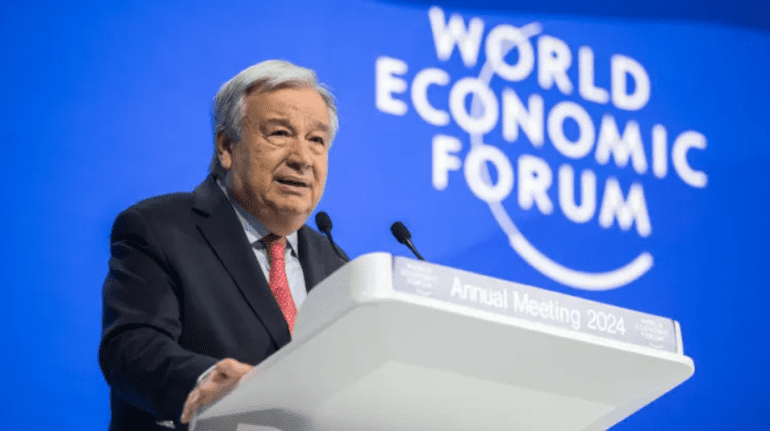TL;DR:
- UN Secretary-General Guterres highlights the urgent need for a global strategy to address AI and the climate crisis.
- The World Economic Forum (WEF) in Davos emphasizes “Rebuilding Trust” with a focus on open dialogue and AI’s significance.
- Guterres cautions against AI’s uncontrolled growth, potentially leading to unforeseen negative impacts.
- Microsoft CEO Nadella supports global AI coordination and standards.
- IMF warns that AI could disrupt nearly 40% of jobs worldwide and exacerbate global inequality.
- Guterres underscores concerns about tech companies prioritizing profits over human rights and privacy.
- Geopolitical divisions hinder the creation of effective global strategies to tackle climate and AI challenges.
Main AI News:
In a pivotal address delivered at the prestigious World Economic Forum in Davos, Switzerland, United Nations Secretary-General António Guterres underscored the imperative for political and business leaders to prioritize a comprehensive global strategy addressing the simultaneous perils of artificial intelligence and the climate crisis. With an overarching theme of “Rebuilding Trust,” this year’s WEF meeting advocates for a return to fundamental principles, fostering open and constructive discourse among policymakers, business magnates, and civil society. Against this backdrop, the rapid advancement of AI emerged as a paramount subject of deliberation.
Guterres sounded the alarm on the unforeseen repercussions that could stem from the hasty proliferation of AI technologies, cautioning against complacency in the face of existential threats such as climate upheaval and the unbridled evolution of artificial intelligence, devoid of adequate safeguards.
“In the face of a series of existential threats, posed by runaway climate chaos and the runaway development of artificial intelligence without guardrails, we seem powerless to act together,” lamented Guterres, highlighting the pressing need for unified global action.
Advocates of AI have extolled its potential to serve humanity in multifarious ways, from expediting medical diagnoses to modeling climate patterns and combating cyber threats. Microsoft CEO Satya Nadella, echoing Guterres’ concerns, stressed the necessity for worldwide coordination in the realm of AI, advocating for the establishment of standards and regulatory frameworks to steer the technology responsibly.
However, Guterres issued a stark warning, emphasizing that each new interaction with generative AI heightens the risk of unforeseen consequences, which could undermine the technology’s potential for sustainable development. Citing a recent report from the International Monetary Fund (IMF), Guterres voiced apprehension that AI’s ascent could exacerbate global inequality, as nearly 40% of jobs worldwide face potential disruption due to its rise.
He also pointed out that certain tech giants have displayed a disregard for human rights, personal privacy, and societal impact, though refraining from singling out specific companies. Guterres stressed that despite the extensive discourse on climate and AI, an effective global strategy to address these challenges remains elusive due to geopolitical divisions.
“Geopolitical divides are preventing us from coming together around global solutions for global challenges. Little wonder that people everywhere are losing faith in governments, institutions, and financial and economic systems,” concluded Guterres, underlining the urgency of transcending these divides to confront the formidable global issues at hand.
Conclusion:
The call for global AI risk management by UN Chief António Guterres highlights the growing importance of addressing AI’s potential consequences alongside the climate crisis. Businesses in the AI sector should prioritize responsible development, standards, and collaboration on a global scale to mitigate risks and ensure sustainable growth while considering the societal impact of their innovations.

